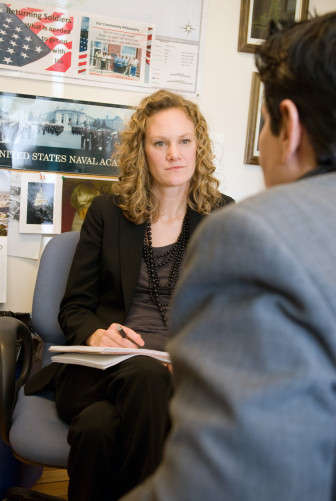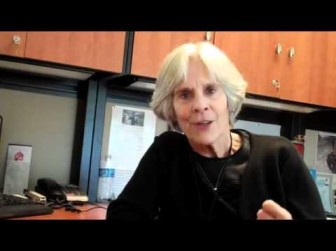In 2009, Edward LaPointe’s life hit bottom as he endured divorce, eviction, and homelessness. His earnings as a cab driver didn’t pay the bills and mental illness overwhelmed him. LaPointe, a Marine Corps veteran, was informed that he was no longer eligible for Social Security disability benefits.
While the VA helped him obtain housing, the pro bono Connecticut Veterans Legal Center got his Social Security back. “All my anxiety left. My depression left. They gave me hope again,” he said of the free lawyers. LaPointe still has psychiatric disorders, but getting disability payments “relieved a lot of stress. I’m at peace now,” he said.
The connection between legal help and medical and quality of life outcomes for veterans has been observed anecdotally in recent years. Now, for the first time, a study will be undertaken to quantify those results with the hope of embedding more free legal services in veterans’ facilities across the country, and giving veterans with mental health and housing needs more opportunities to live productive lives.
The Connecticut Veterans Legal Center, the first legal organization in the U.S. to set-up shop in a VA setting, and the New York Legal Assistance Group will embark on a two-year study financed by nearly $700,000 from the Bristol-Myers Squibb Foundation. Partnering with VA researchers in West Haven, they will follow the legal experiences and outcomes of 400 veterans with mental health and/or housing problems who are being served in West Haven, Newington and two New York City sites.

Dru Nadler Photo
Margaret Middleton
“We know that there’s a great financial benefit for our clients from getting legal services integrated with VA care,’’ said Margaret Middleton, executive director of the Legal Center, which is based in the VA’s Errera Community Care Center in West Haven. “For every dollar we spend on legal services, we return at least $4 in value to our clients,” she said.
Middleton said, “Anecdotally, we also know that legal matters are intensely stressful—facing debt collection or getting divorced or contemplating bankruptcy are huge stressors for veterans or any of us—so what we hope to get out of the study is to demonstrate that legal help is really an essential part of a veteran achieving positive mental health and well-being outcomes.”
For LaPointe, 64, of West Haven, the legal relationship continues. “They’re taking care of me. They’re going out of their way to help me,” he said. He tried three times unsuccessfully to get service-related VA disability benefits for his psychiatric condition. Middleton urged him to try again and with her help that case is now pending. She’s handling another case for LaPointe challenging Social Security’s claim that it overpaid him. LaPointe said because of help he has received from Middleton and the VA’s Errera Center, “I’ve come a long way since 2009.”
The relationship between legal and medical assistance is a relatively new concept for the VA. Middleton’s legal organization, in partnership with the VA, has helped more than 900 veterans with about 1,200 legal issues.
The others are run by the New York Legal Assistance Group, the University of Miami Law School, and Inner City Law Center in Los Angeles, Middleton said. In another 34 VA locations in the country, lawyers provide limited, part-time, free assistance to veterans, according to Laurie Harkness, director of the Errera Center.
In other types of medical facilities, medical-legal partnerships exist in about 275 places, according to a report by The National Center for Medical-Legal Partnership and George Washington University’s Department of Health Policy. “However, no systematic assessment of the impact of such integration has been measured to date,” the report states.
In a 2011 VA survey, homeless veterans listed legal assistance among their top 10 unmet needs. They cited threatened evictions or foreclosures, child support issues, and outstanding warrants or fines as reasons for needing the help.
Dr Robert Rosenheck, a psychiatrist and the VA’s co-principal evaluator for the new study, said having legal counsel “could be incredibly empowering for disadvantaged people,” such as homeless and mentally ill veterans.
Middleton wants the VA to provide funding to legal groups like hers. As a result, the Helping Homeless Veterans Act of 2013, co-sponsored by U.S. Sen. Richard Blumenthal, includes a provision that would permit the VA Secretary to enter into partnerships with legal entities and pay for a portion of legal services provided to veterans who are homeless or at risk of becoming homeless. The Senate passed the bill in November, but the House sent it to its Veterans Affairs Committee. Govtrack.us, a website that tracks bills in Congress, gives it a 14 percent chance of passing.

Laurie Harkness
Harkness, the Errera Center director, praised the free legal assistance that has helped veterans, ranging from drawing up a will to complicated housing issues. She told of a man living at the state Veterans Home & Hospital in Rocky Hill who was dying of cancer and was afraid that when he died, the state would take his possessions, a computer and a pair of boots. A lawyer wrote a will for him and he died peacefully, she said.
Middleton told of a suicidal man with substantial debts that were exacerbating his depression. Her legal center helped him obtain about $2,800 a month in VA disability compensation. “The best possible thing happened,” she said. “After we helped him get his financial life in order, we stopped seeing him at the VA. He didn’t need health services as much. He wasn’t coming in, in crisis. The biggest part of his mental health struggle was trying to manage these legal issues,” she said.
Harkness hopes the study provides evidence to support establishing medical-legal partnerships at VA facilities around the country. If so, “access to legal services is going to remove important barriers to many veterans living successful lives in their communities.’’